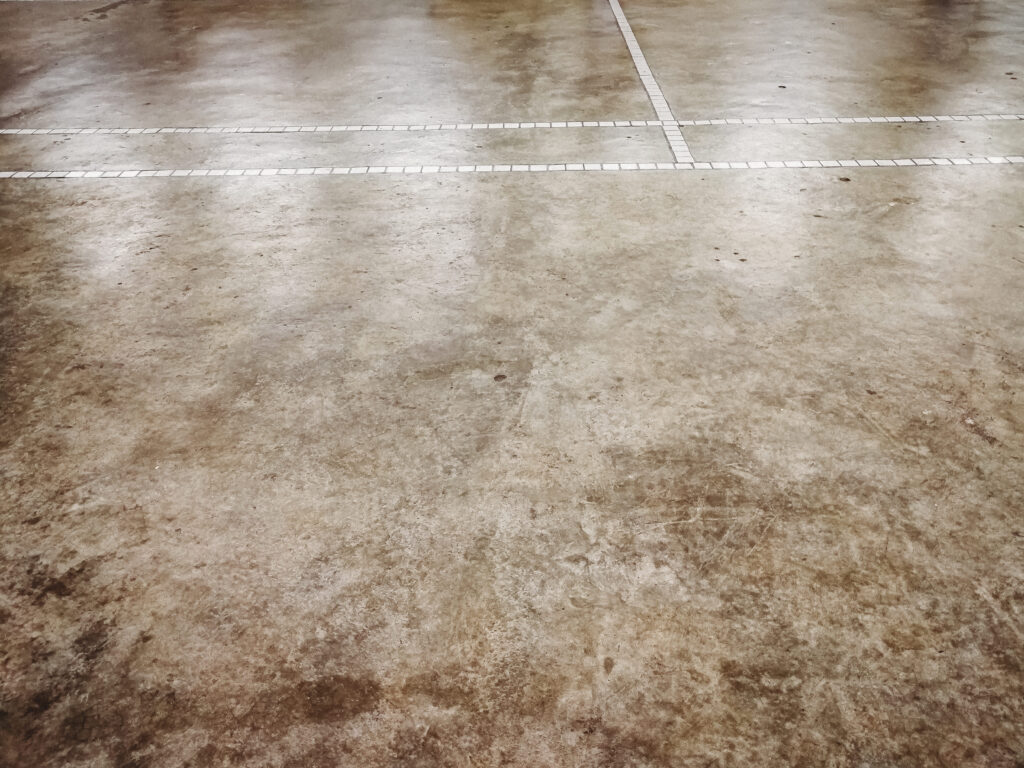Concrete flooring refers to a type of flooring that is made of concrete. It is a popular choice for both residential and commercial spaces due to its durability, low maintenance, and affordability.
Concrete flooring can come in different forms, such as polished concrete, stamped concrete, and stained concrete. Polished concrete is achieved by grinding the concrete surface until it is smooth and glossy. Stamped concrete involves creating patterns and textures on the concrete surface using stamps. Stained concrete involves applying a color or stain to the surface of the concrete to achieve a desired look.
1. What is the difference between concrete flooring and cement screed flooring?
Both concrete flooring and cement screed flooring are used in the construction industry.
Concrete flooring is used for structural and construction purposes, whereas cement screed flooring is applied on the top of concrete floors for a smooth velvety finish.
The main difference between concrete and cement screed lies in the thickness and composition of floors.
2. How much does concrete flooring cost in Singapore?
Concrete flooring costs around $2 to $15 in Singapore.
3. How much does cement screed flooring cost in Singapore?
Cement Screed flooring costs around $15 to $30 in Singapore.
4. Are concrete floors cheaper than wood?
Yes, concrete floors are cheaper than wood floors. Concrete floors cost around $2 to $15 per square foot, whereas wood flooring wooden floors cost around $12 to $20 per square foot.
5. Is polished concrete slippery?
Even though the polished concrete floors look shiny, they are not slippery even in wet conditions.
6. Do concrete floors stain?
Polished concrete floors are resistant but can stain if the spills are not cleaned thoroughly.
7. How long do concrete floors last?
If the concrete floors are installed, polished, and maintained correctly, they can last more than a hundred years.
8. Is concrete flooring eco-friendly?
Yes, concrete flooring is eco-friendly because it doesn’t have elements that affect the environment compared to other flooring types.
9. What are the types of concrete flooring?
Many types of concrete flooring widely installed in Singapore are acid stained, acrylic sealer, metallic or standard epoxy, water-stained, and many more based on the versatility of concrete floors.
10. Is polished concrete colder than tiles?
No, not at all; polished concrete floors are not colder than tiles because concrete floors keep you warm.

11. What are the pros and cons of concrete flooring?
Pros of Concrete Flooring
- Concrete floors are relatively cheaper than other flooring types.
- It is more durable than other flooring types.
- It is straightforward to maintain. Just clean the floor with q quality broomstick and mop it regularly for problem-free concrete flooring.
- You can install a wide range of concrete floors due to their versatility per your requirement.
Cons of Concrete flooring
- Concrete floors are more complex than other flooring types.
- It can absorb the moisture around the environment, making the concrete floors cold.
- One of the main problems with concrete flooring is cracking. If your concrete floors are not installed and maintained correctly, they will form cracks that can damage your floors.
12. Are polished concrete floors suitable for the kitchen?
Yes, polished concrete floors suit the kitchen as they can withstand stains. So you can maintain the polished concrete floors easily.
13. Are concrete floors toxic?
No, concrete floors are non-toxic and eco-friendly to safeguard the environment from pollutants and other toxic chemicals.
14. Do polished concrete floors crack?
Yes, polished concrete floors are subjectable to cracks if the floor is not installed correctly.
15. What is green concrete?
Green concrete is called the “Eco-friendly concrete” as it does not harm the environment because it can be made up of waste products or residual materials so that it can release less carbon dioxide than standard concrete floors, making the green concrete floors more durable and cheap.
16. Is polished concrete waterproof?
No, polished concrete floors are not waterproof, but they are water resistant as they can withstand water absorption and their anti-slippery even though they look shiny.
17. What are the reasons for concrete flooring getting cracked?
When installing concrete floors, if you add excess water to the concrete mix, then it may crack.
Rapid drying on the concrete floors may crack your floors.
If the installed concrete floors have enough strength to withstand the crack formation.
Install concrete floors very thick on the floor joints as it can help to prevent cracking. If you do not take care of joints properly, it can make your floor crack.
If you pour concrete on the frozen ground, it makes your floors weak, leading to cracking.
18. What are the types of concrete cracks?
There are four different types of concrete cracks.
- Hairline cracks
- Shrinkage cracks
- Settlement cracks
- Structural cracks
Hairline cracks are formed as the concrete floors widen over time, and they can accumulate dirt.
When the concrete floors dry, it evaporates the water from the space between particles, then the particles move closer, which results in the shrinkage of concrete. To prevent crack, you can install proper joint placements.
Settlement cracks form if the soil is uneven after the concrete floor installation.
Structural cracks form due to moisture, insects, and seeping. You can repair or replace the concrete floors.
19. How often do you have to polish concrete floors?
You have to polish the concrete floors once every 2 to 3 years.
20. Is polished concrete dusty?
No, polished concrete floors cannot accumulate dust. Dust proofing and sealing can help you to prevent dust.
21. Can I have a concrete floor in the bathroom?
Yes, you can install the bathroom’s concrete floors as they have anti-slippery properties.
22. Is thicker concrete less likely to crack?
Concrete floors less than 5 inches are prone to cracking.
23. How long does concrete last before cracking?
Cracking starts after 12 hours of installation if it is not installed correctly.
24. Is there a cheaper alternative to concrete?
Cortex is the rollable concrete sheets that can be activate with water and are the cheaper alternative to concrete flooring.
25. Do concrete floors require high maintenance?
No, Instead concrete floors do not require high maintenance as concrete floors require only low maintenance.

26. Can you vacuum polished concrete floors?
Yes, however you can vacuum polished concrete floors. Use a vacuum or microfibre mop to clean your polished concrete floors.
27. Is polish concrete cheaper than carpet?
Yes, however polished concrete floors are relatively cheaper than carpet flooring.
28. What is the minimum thickness of concrete flooring?
The minimum thickness of concrete flooring is 1/2 inches (89 mm).
29. Can you mop concrete floors?
Yes, however you can mop your concrete floor with a good quality mop and mild cleaner diluted with water.
30. Does HDB do cement screeding?
So HDBs stopped installing Smooth floor rendering service with cement screed flooring in 2014 provided upon request.
31. Can stain concrete floors expensive?
No, Instead stained concrete floors are not expensive, and it is affordable as it costs $2 to $4 per square foot.
32. When should I start watering my concrete?
So you can start watering your concrete after 12 hours of installation.
33. What is the standard thickness of concrete flooring?
Generally the standard thickness of concrete flooring is 4 to 6 inches. 6 inches thickness is best suited for heavy traffic areas.
34. How often do we have to seal concrete floors?
To increase durability, you must seal your concrete floors every 2 to 5 years.
35. Can old concrete be resurface?
Basically you can make your old concrete flooring a new one with concrete resurfacing.
36. Is it OK to pour concrete over existing concrete?
Yes, however you can pour concrete over existing flooring as it can increase the thickness of concrete floors.
37. Can you put a thin layer of concrete over concrete?
Yes, however you can put a thin layer of concrete over concrete as it won’t affect your new concrete flooring.
38. What is the best concrete overlay?
Sun Stone, Classic Texture or Tuscan are the best concrete overlays widely use for concrete flooring.
39. Why is the concrete floor always sweating?
Concrete floors release sweat because they didn’t install the floor correctly and address moisture below the slab.
40. How much does it cost to seal concrete floors?
So sealing concrete floors can cost around $1.20 – $1.75 in Singapore.
41. Can we polish existing concrete floors?
Yes, basically you can polish your existing concrete floors. You can polish new and old concrete floors to give a new life to them.
42. How thick is the concrete floor in a house?
The concrete flooring in a house should have at least 100mm thickness.
43. What flooring is best over concrete?
Especially engineered Wood, Vinyl, Laminate, Carpet, and Tile flooring are the best flooring that can install over concrete flooring.
44. Is polish concrete better than epoxy?
Yes, polished concrete flooring is better than epoxy flooring.
45. Is stain concrete floors expensive?
No, stained concrete floors are not more expensive than other types of flooring. So it costs around $2 to $4 per square foot.
46. Is polishing concrete floors expensive?
No, Instead polishing concrete floors is not expensive, and matte polish costs $2 to $6 per square foot. For High gloss polish – $3 to $8 per square foot.
47. Can we paint concrete floors?
Yes, however you can paint the concrete floors to upgrade your old concrete flooring and increase the elegance of your feet.
48. How long does concrete floor paint last?
The concrete floor painting can last upto 3 to 5 years.
49. Does a concrete floor need primer before painting?
Yes, concrete flooring needs a primer before painting the floors.
50. How many layers of paint do I need for concrete?
So two to three coats of paint are need for the concrete floor painting.

